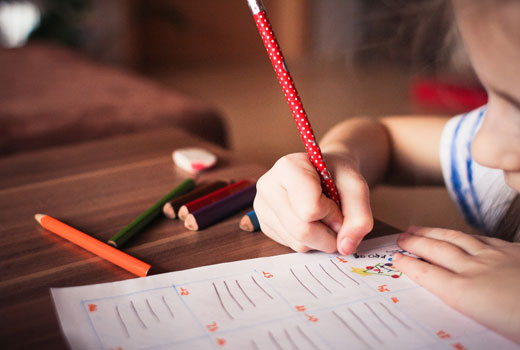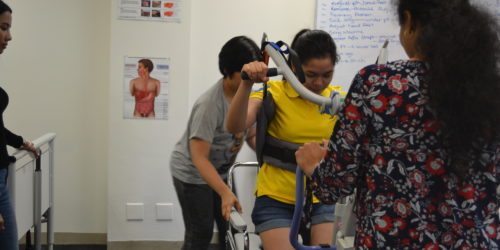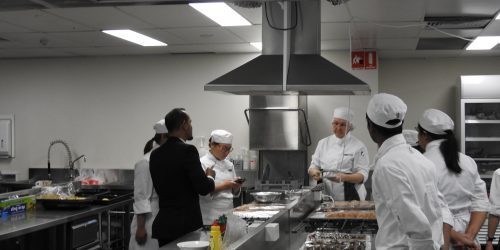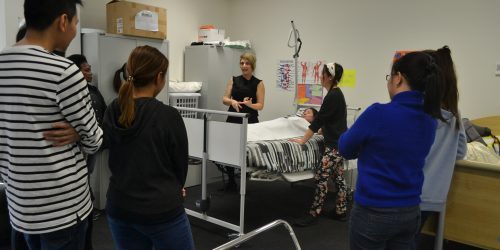5 childhood development theories childcare workers should know

Childcare is a very hands-on profession – however, that’s not all there is to it. It’s also one that involves a lot of theoretical learning.
That’s because you’re more than just a babysitter – childcare workers play a vital role in shaping young lives.
Just ask any parent and they’ll all tell you that even the subtlest things in childhood can dramatically shape the sort of person a toddler grows into.
If you’re to have a positive impact on the children in your care, you need to understand how childhood development works, and how your actions can influence them.
That’s why our childcare courses in Brisbane feature such a heavy focus on delivering a holistic approach towards childcare training.
Instead of focusing just on the practical, hands-on stuff, we also go into depth teaching you about the theory.
Once you’re done, you’ll come out the other side with a deeper understanding of how you can shape these young lives, including an understanding of several prominent theories of childhood development.
The usual suspects: some of the more prominent theories you’ll learn when you study childcare in Brisbane
Lev Vygotsky’s Sociocultural theory
Early childhood isn’t just a time for physical and psychological development – according to Lev Vygotsky’s Sociocultural theory, it’s also where social skills are first developed.
Whether it’s their parents, relatives, other kids or childcare workers like yourself, a child’s interactions with everyone at this stage contributes to their overall social development, as well as their linguistic and mental development.
In particular, Vygotsky theorised that this social development actually spurs other areas of cognitive development – for example, speech develops in response to a need to communicate with the other people in a child’s life.
Gardner’s theory of multiple intelligences
Psychology is increasingly abandoning the traditional IQ test – and it’s all thanks to this theory.
Howard Gardner proposes that both children and adults have multiple “types” of intelligence that build and develop through time:
- Musical
- Spatial (ability to visualise the world)
- Linguistic
- Interpersonal
- Intrapersonal (self-awareness)
- Naturalist
- Logical-mathematical
- Bodily-kinesthetic
This theory not only focuses on one area of intelligence but seeks to look at other learning abilities – something that has revolutionised early childhood education curriculums around the world.
Instead of focusing on the 3 Rs (reading, writing and arithmetic), this model casts a wider net and recognises the importance of fostering the other facets of a child’s intelligence.
The result? More holistic childcare programs that build up all of these different intelligences.
Jean Piaget’s Cognitive Developmental Theory
You need to walk before you’re able to run – essentially, Piaget’s Cognitive Development Theory takes that idea and applies it to cognitive development!
This theory proposes that childhood development is sequential – a child must master each stage before being able to move on to the next one.
What does this cognitive development theory mean for early childhood educators and parents?
Simple: that a child’s ability and skill may be limited by what developmental stage they’re at – that’s why you need to give them tasks that are appropriate for their age and of course, their current ability.
By understanding this theory, you’ll understand what those stages are, as well as what activities are most suitable for the kids in your care.
John Dewey’s Theory of connected experience
A child’s interaction with other people is important in their development, as they need to realise that they belong to a community with various social and cultural backgrounds.
Not only that, but experiential education is known to be more engaging and effective than traditional learning.
While they may not sound like revolutionary ideas, they certainly were when John Dewey first thought them up!
This theory proposes that childhood educators and parents need to find opportunities for children to interact with others, as well as incorporate as much play-based learning as possible for them to make sense of the world they live in.
Maria Montessori’s Intellectual development theory
If you’re a parent yourself or work with them on a regular basis, then this name probably rings a couple of bells!
If you’ve heard of the Montessori Method, you’ve heard of this development theory.
Essentially, this play-focused theory of childhood learning and development is an extension of Dewey’s Theory of Connected Experience (see above), proposing that learning should be:
- Free-form and unstructured
- Self-directed and driven by children rather than teachers
- Capture children’s attention and imagination
- Using observation instead of grading and testing
- Overseen by teachers who take a hands-off approach
While you may decide against implementing the entire Montessori Method, there’s nothing stopping childcare workers like yourself from integrating many of her techniques and practices into your centre!
Explore our online childcare courses
Whether you’re planning on starting a career in childcare education or you’re looking to upskill and seek out more work opportunities as a childcare worker, Academia offers a range of different online childcare courses.
With our holistic approach towards training, you’ll learn everything about early childhood development.
And that’ll allow you to provide better care and get better outcomes for all of the kids in your car.
All of our childcare courses are delivered in-person and using our online learning system, which replicates the classroom experience as much as possible with:
- Small class sizes
- Actual classes, not recordings, all taught by experienced instructors
- Virtual whiteboards that let you interact with the content
Learn more about our online childcare courses in Brisbane today!
Certificate III in Early Childhood Education and Care (CHC30113)
Learn the foundations of childcare – this course offers a holistic perspective, including many of the theories of early childhood development listed above!
This course will teach you the basics of early childhood theories as well as how to provide care for kids of all ages. It’ll give you all the tools and frameworks you need to provide a healthy environment for children to learn and play.
Explore the Certificate III in Early Childhood Education and Care.
Diploma of Early Childhood Education and Care (CHC50113)
Are you planning to manage your family daycare facility? Simply looking to turn yourself into a more attractive candidate for promotion? This course is just what you need.
Learn everything there is about leading a team of childcare educators and running your own facility. In addition to the day-to-day responsibilities, you’ll also learn about accreditation, licensing requirements, and leadership skills to help manage your childcare centre.
Find out more about our Diploma of Early Childhood Education and Care.
Have questions about our childcare courses in Brisbane?
Our friendly course advisors are more than happy to answer any questions you might have about our childcare courses, the content as well as our way of doing things – all you need to do is get in touch!
- Call our Brisbane campus on (07) 3001 5300
- Find out more about our enrolment process






